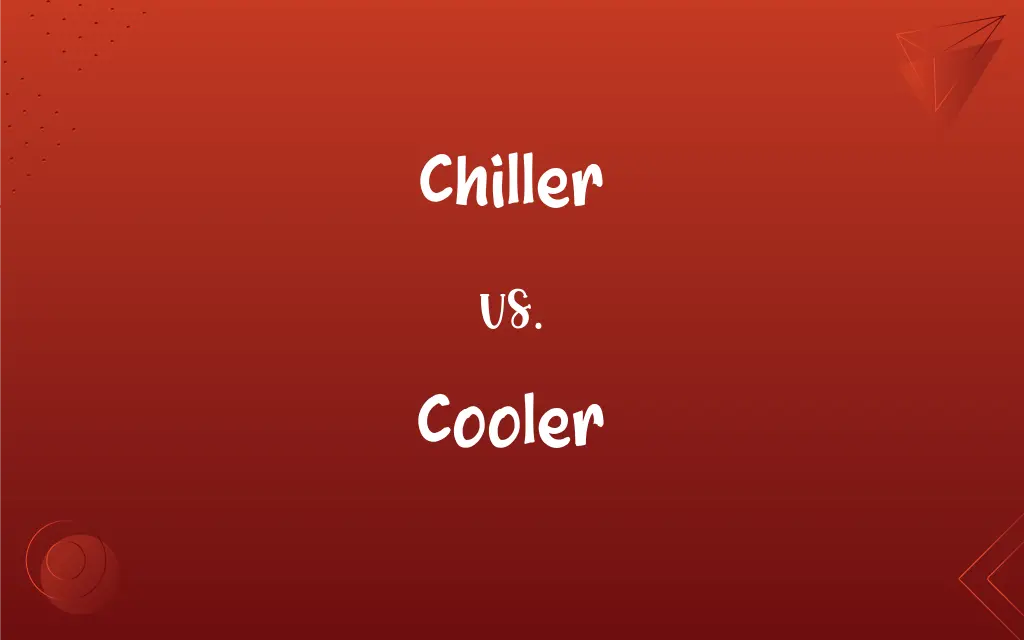Chiller vs. Cooler: What's the Difference?
Edited by Aimie Carlson || By Janet White || Updated on October 10, 2023
A chiller is a machine that removes heat from a liquid via a vapor-compression or absorption refrigeration cycle, while a cooler is a device or container that maintains a lower temperature to keep items cool.

Key Differences
Chiller and cooler, while similar in their cooling functions, possess distinctive differences in their operations and applications. A chiller is a complex piece of equipment typically used for industrial or commercial cooling purposes, such as air conditioning systems or cooling manufacturing processes. Conversely, a cooler is a more simplified, portable solution commonly used for preserving perishable goods, such as food and beverages, at lower temperatures, making it a domestic staple for outings and events.
While chillers primarily deal with cooling liquids like water or brine, circulating it through a cooling process, coolers typically involve the cooling of solid items or air. Chillers are critical in various industries due to their capability to maintain precise temperatures, ensuring the optimal functioning of machinery and the preservation of sensitive materials. In contrast, coolers are known for their convenience and mobility, serving as temporary storage to prevent spoilage and maintain the freshness of consumables during transit or stationary periods.
In terms of energy consumption and capacity, chillers usually have a higher demand due to their extensive applications and larger size. They are integral components in systems where a substantial amount of heat needs to be dissipated continuously. Coolers, with their compact nature and simplistic design, are designed for personal or small-scale use, with a focus on portability and ease of use, making them a popular choice for individual consumers.
The terms chiller and cooler, although different in usage, converge on the essential aspect of temperature reduction. Chillers, with their advanced mechanisms, play a crucial role in controlling temperatures in large-scale operations, ensuring the smooth running of industrial and commercial endeavors. Coolers, on the other hand, with their user-friendly approach, attend to the immediate needs of individuals, providing a convenient way to preserve food and drinks, especially in outdoor settings.
Both chiller and cooler are significant in their respective realms, catering to different needs and scales of operation. The chiller, with its sophisticated functionality, is indispensable in sectors where precise temperature control is pivotal. The cooler, with its accessibility and portability, remains a favored accessory for those seeking to keep items chilled, especially in informal, outdoor environments.
ADVERTISEMENT
Comparison Chart
Primary Use
Industrial or commercial cooling of liquids
Domestic cooling of items or air
Complexity
Complex machinery with high energy consumption
Simple, portable container with less energy consumption
Application
Used in manufacturing processes, air conditioning systems, etc.
Used to preserve perishable goods like food and beverages
Scale
Large-scale operations
Small-scale, personal use
Temperature Maintenance
Maintains precise temperatures
Maintains lower temperatures
ADVERTISEMENT
Chiller and Cooler Definitions
Chiller
A chiller is essential in industries for controlling temperatures in large-scale operations.
The new chiller significantly improved the temperature regulation in the production line.
Cooler
A cooler is a device that maintains a lower temperature to preserve perishables.
The cooler kept the fish fresh until we returned home.
Chiller
A chiller is used to maintain specific and constant temperatures in various applications.
The chiller plays a crucial role in ensuring the optimum temperature in the laboratory.
Cooler
A cooler can refer to a compartment or room for storing items at a cool temperature.
Store the wine bottles in the cooler to maintain their quality.
Chiller
A chiller is a device that removes heat through a vapor-compression or absorption refrigeration cycle.
The chiller efficiently reduced the temperature of the water in the cooling system.
Cooler
A cooler is typically lightweight, making it convenient for transport and travel.
The lightweight cooler was easy to carry to the beach.
Chiller
A chiller is an industrial machine used for cooling liquids.
The manufacturing plant installed a new chiller to cool the processed liquid.
Cooler
A cooler is a portable container used to keep items, usually food and drinks, cool.
We packed our sandwiches and drinks in the cooler for the picnic.
Chiller
A chiller can be integral in air conditioning systems to dissipate heat.
The building’s chiller broke down, causing discomfort to the occupants.
Cooler
A device, container, or room that cools or keeps cool.
Chiller
One that chills.
Cooler
A cold drink, usually carbonated, fruit-flavored, and containing wine or other alcoholic ingredients. Also called wine cooler.
Chiller
A frightening story, especially one involving violence, evil, or the supernatural; a thriller.
Cooler
(Slang) A jail.
Chiller
Something that chills
Cooler
Anything which cools.
Chiller
A machine that produces cold air, either for air conditioning, to prepare chilled foods etc.
Cooler
An insulated bin or box used with ice or freezer packs to keep food or beverages cold while picnicking or camping.
Chiller
A heat exchanger between a coolant and a refrigerant, to transfer heat from the coolant loop into the refrigeration system
Cooler
A device for refrigerating dead bodies in a morgue.
Chiller
A machine that removes heat from the working fluid in a refrigeration cycle
Cooler
A type of drink made with alcohol, especially wine, mixed with fruit juice.
They served wine coolers in the afternoon.
Chiller
A frightening dramatic work, such as a book or film
Cooler
Samalamig
Chiller
Excitation that makes your hair stand up or that chills your bones;
The movie was an old-fashioned hair-raiser
Cooler
A prison.
Cooler
A bouncer or doorman.
Cooler
A cold deck.
Cooler
That which cools, or abates heat or excitement.
If acid things were used only as coolers, they would not be so proper in this case.
Cooler
Anything in or by which liquids or other things are cooled, as an ice chest, a vessel for ice water, etc.
Cooler
An alcoholic beverage containing liquor or wine plus a carbonated beverage, usually served with ice.
Cooler
Jail; - usually used in the form the cooler.
Cooler
An air conditioner.
Cooler
A refrigerator for cooling liquids
Cooler
An iced drink especially white wine and fruit juice
Cooler
A cell for violent prisoners
Cooler
A cooler is often insulated and can maintain temperature for extended periods.
The cooler kept the beverages cold throughout the entire trip.
FAQs
Can chillers cool solid items directly?
Chillers primarily cool liquids which can indirectly cool solid items.
Can coolers maintain precise temperatures?
No, coolers maintain a lower temperature but not with the precision that chillers can.
Can a chiller be used for domestic purposes?
Typically, chillers are used for commercial or industrial purposes due to their complexity and size.
Do chillers always involve a vapor-compression cycle?
Most chillers use a vapor-compression or absorption refrigeration cycle, but the method may vary.
Can coolers cool air?
While coolers primarily cool items, some devices termed as air coolers are used to cool air.
Is a chiller the same as a cooler?
No, a chiller is a machine used for industrial cooling, while a cooler is a portable container for keeping items cool.
Can coolers be used to cool liquids?
Yes, coolers can be used to keep liquids like beverages cool.
Is a cooler an essential item for camping trips?
Yes, a cooler is a popular and practical item to have on camping trips to keep perishables fresh.
Is a cooler suitable for large-scale operations?
No, coolers are usually suitable for personal or small-scale use due to their simplicity and portability.
Is energy consumption higher in chillers?
Yes, chillers usually have higher energy consumption due to their extensive applications and size.
Are chillers used in air conditioning systems?
Yes, chillers are integral components in many air conditioning systems.
Can a cooler be used in industrial processes?
Typically, coolers are not suitable for industrial processes that require precise temperature control.
Can a chiller be portable?
Generally, chillers are not portable due to their size and complexity.
Can chillers be used to store food and drinks?
Indirectly, by cooling liquids that in turn cool storage spaces.
Are coolers insulated?
Yes, most coolers are insulated to maintain temperature for extended periods.
About Author
Written by
Janet WhiteJanet White has been an esteemed writer and blogger for Difference Wiki. Holding a Master's degree in Science and Medical Journalism from the prestigious Boston University, she has consistently demonstrated her expertise and passion for her field. When she's not immersed in her work, Janet relishes her time exercising, delving into a good book, and cherishing moments with friends and family.
Edited by
Aimie CarlsonAimie Carlson, holding a master's degree in English literature, is a fervent English language enthusiast. She lends her writing talents to Difference Wiki, a prominent website that specializes in comparisons, offering readers insightful analyses that both captivate and inform.






































































